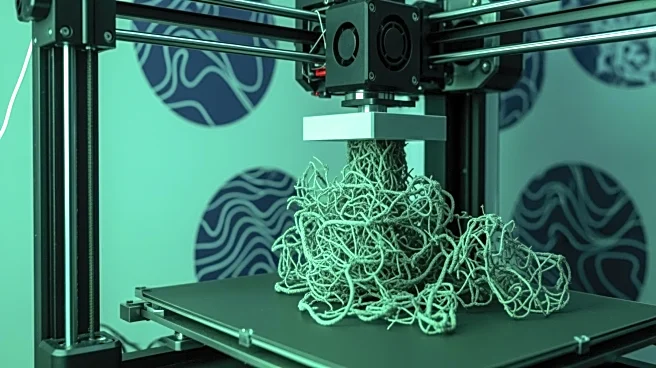What's Happening?
Researchers at the Indian Institute of Science (IISc) in Bengaluru have developed a new method to recycle fishing nets made from Nylon 66 into 3D-printed products. This innovative process involves a chemical reaction known as transamidation, which allows
the rapid conversion of waste plastic into reusable material. The method, which takes less than two minutes, can be integrated into existing industrial recycling systems. The research, led by Professor Suryasarathi Bose and PhD student S Vimal Kumar, aims to address the environmental impact of abandoned fishing nets, which are difficult to recycle and harmful to marine ecosystems. The recycled material can be used to produce durable products such as park benches and road dividers.
Why It's Important?
This development is significant as it offers a sustainable solution to the problem of plastic waste, particularly in coastal areas where abandoned fishing nets are prevalent. By converting these nets into valuable products, the method not only helps reduce environmental pollution but also creates economic opportunities for coastal communities. The process is energy-efficient and environmentally friendly, providing a viable alternative to traditional recycling methods that are often time-consuming and require harmful solvents. This innovation could potentially transform the recycling industry by enabling the efficient reuse of hard-to-recycle plastics.
What's Next?
The IISc team, in collaboration with industry partners, plans to scale up the technology for broader application. The startup VOiLA3D, co-founded by Professor Bose, is already utilizing the recycled plastics for 3D printing various products. As the method gains traction, it could lead to increased adoption in industries that deal with plastic waste, promoting a circular economy. Further research and development may focus on extending the process to other types of engineering plastics, enhancing the range of recyclable materials and products.
Beyond the Headlines
The method's ability to transform waste into high-value products highlights the potential for innovation in addressing environmental challenges. It underscores the importance of interdisciplinary research in developing practical solutions for global issues like plastic pollution. The initiative also reflects a growing trend towards sustainable manufacturing practices, which could influence policy decisions and encourage investment in green technologies.
















